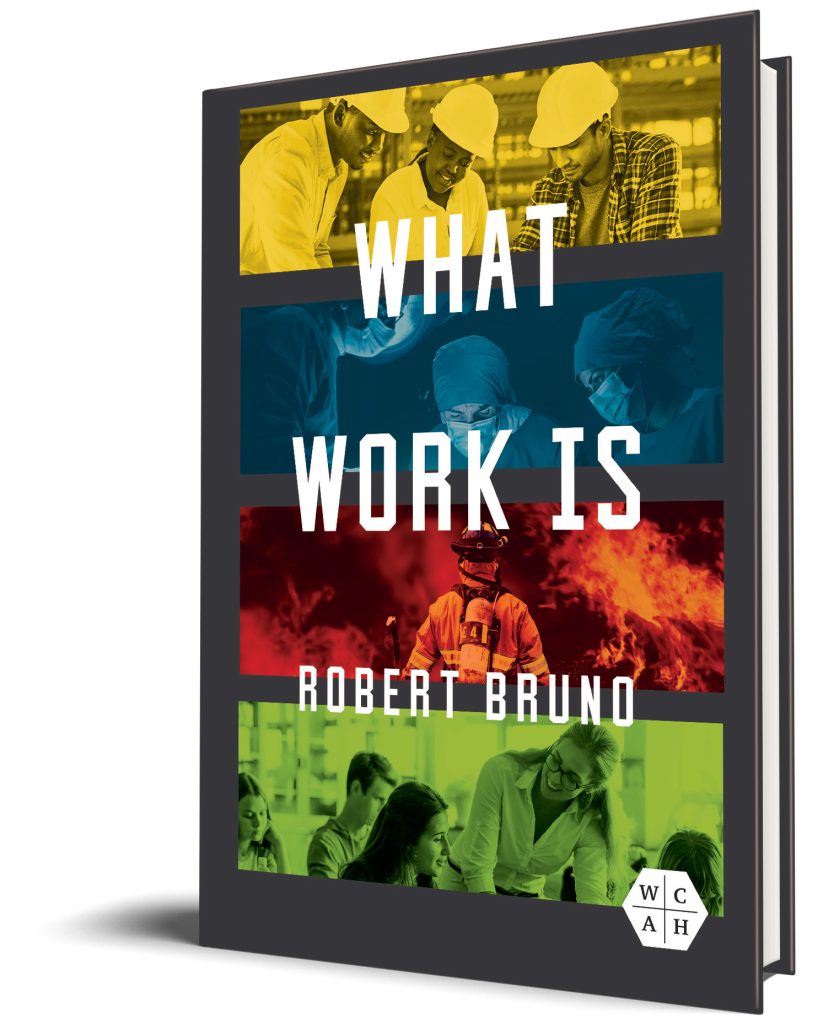Robert Bruno, author of What Work Is, answers questions on his new book.
Q: Why did you decide to write this book?
I discovered the poetry of Phillip Levine. His eponymous poem, “What Work Is” expressed a poignant reality about the lived experience of work for those who depended on their labor to survive. Work did things for and to you. It gave and took and life. I began to recite the poem in my classes with workers and each time I realized that it was evoking something powerful in them and me. Work is everywhere. We talk about our jobs and about good and bad work. However, not how work is experienced. Strange really. Our work is an essential human activity. Perhaps the thing that most defines us as a species is that we consciously approach our work. Labor is the condition of human existence which mediates life itself. And since work means so much to all life and is a constant subject of denouement, I decided to ask workers what work is. Once they told me I thought it was worth telling others.
Q: What is the most interesting discovery you made while researching and writing your book?
Elements of the five dominant concepts – time, space, impact, purpose, and subject – that constituted how work was experienced were illuminating. Fascinating and scary the way that time is controlled by the workday. Time loses all objective neutrality and becomes a specific characteristic of employment. That’s a deep measure of hegemonic control over our lives. And the idea that workers exist everywhere in the physical world they have created but are nearly invisible obscures how interdependent our lives truly are and how dependent we are on the labor of others. Also, the notion of a secularize workmanship idea whereby because we are creative beings our labors make us like “miniature Gods” was a moment of awe for me.
Q: What myths do you hope your book will dispel or what do you hope your book will help readers unlearn?
Too often folks think that we are the only subject of our own work. That our labor is individualistic and self-serving, and nothing more than a means of earning. But the subject of work is more than the person doing it; it’s also other people we love and those who are strangers to us. And yeah, we work for pay to physically survive, but it’s the intrinsic benefits that most determine how satisfied or happy we are with our creative labors. In other words, work appears to be a feature of economics. But it is instead, essential to our identities as human beings. It is in this sense, thoroughly political.
Q: Which part of the publishing process did you find the most interesting?
In the case of What Work Is, I found that responding to the reviewers was a very intellectually satisfying exercise. The reviews were extensive, and it was obvious the readers read carefully. I was pleased and encouraged that the reviewers were very enthusiastic about the manuscript. But they had critiques that required me to do some additional thinking which led me to do some important additional writing. Another part of the process that was fascinating was figuring out with the press’ art team what the book cover would look like. How in the world do you visualize what work is? I first suggested something symbolic and ethereal, and included preferences for colors. The art team came back with something more grounded in realism which we tweaked a bit. I like what we agreed upon. And it was the first time I was asked about ideas for the cover of one of my books. You know what they say about judging a book by its cover?
Q: What is your advice to scholars/authors who want to take on a similar project?
Two suggestions. First, have something interesting to say. Second, take on a writing project that doesn’t have as its objective the definitive account of a subject. This might sound contrary to publishing something meaningful but it’s liberating. Don’t look to write the end-all of all books on your topic. Your book is important but it’s always going to be one perspective. Think of it as a scientific exploration and not a grand final discovery. Find the compelling aspect of your work and share it skillfully. If you do this, within the process of collecting data, writing and re-writing you’ll realize the happiness of pursuit beats the pursuit of happiness.
Q: What do you like to read/watch/or listen to for fun?
I like reading about rock and roll music and cinema from the 1970s. Really enjoy going to tribute band concerts at old classic theaters – can’t get enough of Pink Floyd tribute bands. Also enjoy listening to podcasts about philosophy.

Robert Bruno is a professor of labor and employment relations at the University of Illinois Urbana-Champaign, where he also serves as Director of the Labor Education Program. He is the author of Justified by Work: Identity and the Meaning of Faith in Chicago’s Working-Class Churches; Steelworker Alley: How Class Works In Youngstown; and Reforming the Chicago Teamsters: The Story of Local 705. He is a coauthor of A Fight for the Soul of Public Education: The Chicago Teachers Strike.

